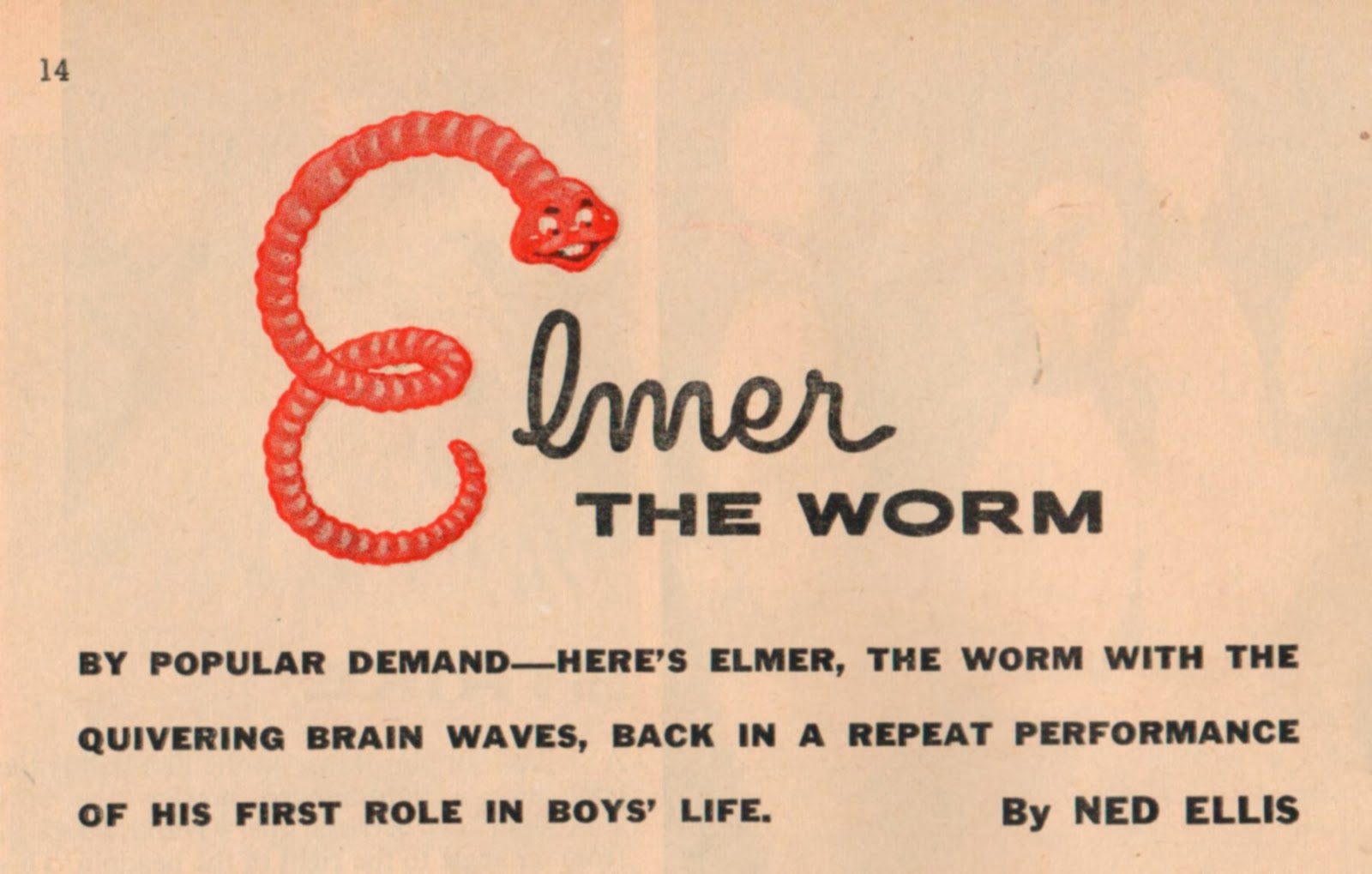As I wrote yesterday, I found and bought an old issue of Boys' Life (March 1959) that contained a story about a wise worm named Elmer, a story I remembered reading back in 1959. Yesterday, I wrote a bit about my search--and about the magazine itself, which arrived from an eBay seller just a couple of days ago.
And now ... a little about the Elmer story itself. Oh, first--I was unable on Google to learn anything else about writer Ned Ellis, author of the four Elmer tales in Boys' Life. More assiduous work might reveal something, and maybe one day I'll be in a more assiduous mood and will do some more assiduous ... digging (appropriate choice of words in a story about a worm!).
As you can tell from the picture at the top of the page, this Elmer story is the origin story (Elmer had appeared a few years earlier in a Christmas story). The first-person narrator, Stu, is an eighth grader (odd: I spent most of my career teaching that species). He begins by telling us he's digging for worms because he's planning to go fishing. To keep his crop he has "one of those old flat tobacco cans" (14). Then he notices that one of the worms has drawn an SOS in the dirt. He notices, too, that this particular worm is warm, not cold.

He goes fishing but decides to keep this warm worm, whom he names Elmer when he sees, back in his room, that the worm has spelled that name in some spilled dirt from the tobacco can. He decides to house Elmer in that tobacco can.
Then ... Stu discovers that Elmer can communicate with him--telepathically. "I have the highest brain-wave output in the worm world," he says, "and you have the lowest resistance to brain-wave input in the human world. You have a very soft head" (14). Nice compliment.
Elmer and Stu reach a deal: Stu will keep the worm alive, and Elmer will help Stu with his homework. "I'll tune in on the teacher's thoughts and relay the answers," he says (14).
Cheating, in other words. There's no real censure for this in the story. As we'll see, there are some consequences, but the cheating goes on all year, and Stu emerges as the class academic star. He fools his mother by taking his books home every night (though he doesn't use them), and he scores the highest grade ever on his final exams.
On the last day of school, the teacher asks to hear jokes from the class, and Elmer gives Stu one that's insulting about teachers--about how teachers are like windmills because they both run on hot air. His classmates love it, but the joke hurts his teacher's feelings. Stu worries she will call his parents, and he will get a "licking" (15). (For those of you who are chronologically challenged, a "licking" was a whupping.)
At graduation, he will give the speech--the speech both his mother and Elmer helped him compose. But when he stands up to deliver it, here's how it starts: "This place smells like an old tobacco can. Why don't you change the dirt in here once in a while. Do you want me to suffocate?" (28). He runs out, puts Elmer in his gym locker, then returns to do his speech. "Several people said I was a genius," he notes--because they'd praised him for such an unexpected introduction.
Later, Elmer admits he has grand plans for Stu--including becoming the President of the United States. Alarmed, Stu takes him outside and dumps him in the dirt.
Next morning--full of regret--he goes to look for Elmer. No luck.
**
I wasn't much older than Stu when I read this story, and its appeal is obvious. I, like Stu, hated homework (didn't do it all that often--so how could I hate it?), and I thought having a worm in my pocket to give me all the answers would be awesome. It's kind of the American Dream, isn't it (or, at least, one version of it): Having knowledge without really doing too much to acquire it? (Sci fi is full of such stories--brain infusions, smart-pills, that sort of thing.) We are the species--at times--that likes not to learn things but to have learned them. The Lotto Mentality: I'll get rich by scratching a card instead of ....
The cautionary aspects of "Elmer the Worm" are slight. Yes, surrendering yourself to an apparently beneficent authority can get you in trouble--but, it seems, people are so dense that they don't really care. In fact, that "trouble" can sometimes confer upon you some sort of celebrity. And cheating, for many, is all right--if they get away with it. (Again: We are generally sorry only after we've been caught.)
And I just realized that Elmer is still around. In fact, he's everywhere--present in many kids' pockets. I'm referring, of course, to smart-phones, devices that are so ubiquitous that circumspect teachers must assume that Elmer is nearby, whispering answers if not knowledge.



I remember these stories very well. As a kid I enjoyed them very much. Thanks for the post!
ReplyDelete"Elmer the Worm," Sept. 1953
ReplyDelete"Elmer's Return," Sept. 1954
"Elmer Goes Fishing," July 1955
"Elmer the Quarterback," September 1955
"Elmer Joins the Band," August 1956
The Boys' Life magazine archive is online.
ReplyDeleteHere is a search result for twelve Elmer the Worm stories:
http://boyslife.org/wayback/#search=elmer%20worm%20ned%20ellis